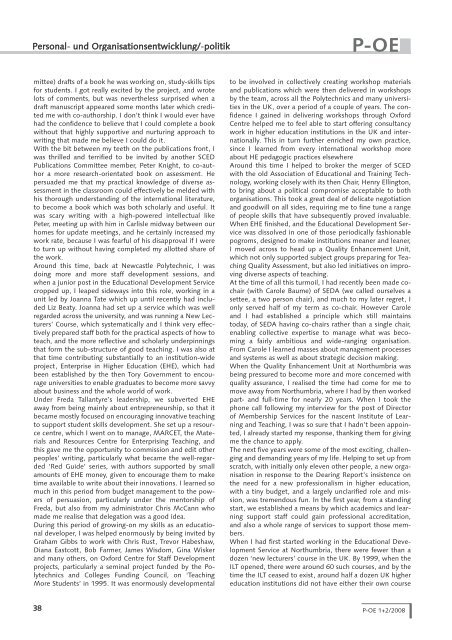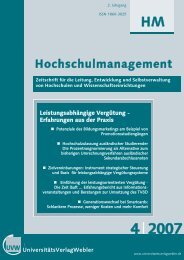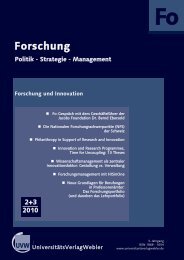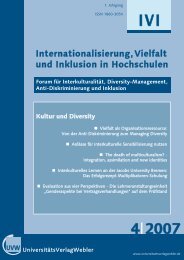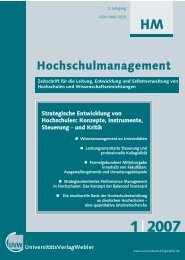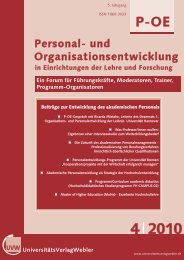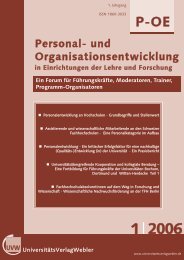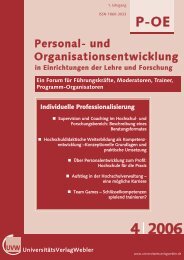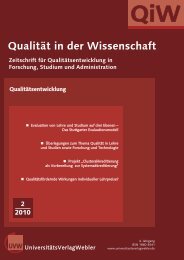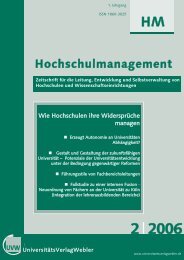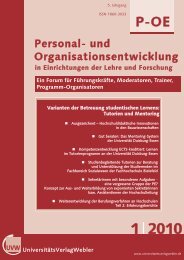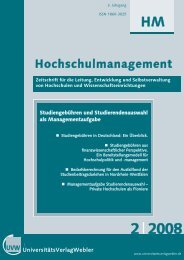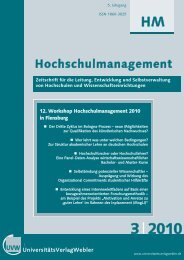P-OE - UniversitätsVerlagWebler
P-OE - UniversitätsVerlagWebler
P-OE - UniversitätsVerlagWebler
Erfolgreiche ePaper selbst erstellen
Machen Sie aus Ihren PDF Publikationen ein blätterbares Flipbook mit unserer einzigartigen Google optimierten e-Paper Software.
Personal- und Organisationsentwicklung/-politik<br />
P-<strong>OE</strong><br />
mittee) drafts of a book he was working on, study-skills tips<br />
for students. I got really excited by the project, and wrote<br />
lots of comments, but was nevertheless surprised when a<br />
draft manuscript appeared some months later which credited<br />
me with co-authorship. I don’t think I would ever have<br />
had the confidence to believe that I could complete a book<br />
without that highly supportive and nurturing approach to<br />
writing that made me believe I could do it.<br />
With the bit between my teeth on the publications front, I<br />
was thrilled and terrified to be invited by another SCED<br />
Publications Committee member, Peter Knight, to co-author<br />
a more research-orientated book on assessment. He<br />
persuaded me that my practical knowledge of diverse assessment<br />
in the classroom could effectively be melded with<br />
his thorough understanding of the international literature,<br />
to become a book which was both scholarly and useful. It<br />
was scary writing with a high-powered intellectual like<br />
Peter, meeting up with him in Carlisle midway between our<br />
homes for update meetings, and he certainly increased my<br />
work rate, because I was fearful of his disapproval if I were<br />
to turn up without having completed my allotted share of<br />
the work.<br />
Around this time, back at Newcastle Polytechnic, I was<br />
doing more and more staff development sessions, and<br />
when a junior post in the Educational Development Service<br />
cropped up, I leaped sideways into this role, working in a<br />
unit led by Joanna Tate which up until recently had included<br />
Liz Beaty. Joanna had set up a service which was well<br />
regarded across the university, and was running a New Lecturers’<br />
Course, which systematically and I think very effectively<br />
prepared staff both for the practical aspects of how to<br />
teach, and the more reflective and scholarly underpinnings<br />
that form the sub-structure of good teaching. I was also at<br />
that time contributing substantially to an institution-wide<br />
project, Enterprise in Higher Education (EHE), which had<br />
been established by the then Tory Government to encourage<br />
universities to enable graduates to become more savvy<br />
about business and the whole world of work.<br />
Under Freda Tallantyre’s leadership, we subverted EHE<br />
away from being mainly about entrepreneurship, so that it<br />
became mostly focused on encouraging innovative teaching<br />
to support student skills development. She set up a resource<br />
centre, which I went on to manage, MARCET, the Materials<br />
and Resources Centre for Enterprising Teaching, and<br />
this gave me the opportunity to commission and edit other<br />
peoples’ writing, particularly what became the well-regarded<br />
‘Red Guide’ series, with authors supported by small<br />
amounts of EHE money, given to encourage them to make<br />
time available to write about their innovations. I learned so<br />
much in this period from budget management to the powers<br />
of persuasion, particularly under the mentorship of<br />
Freda, but also from my administrator Chris McCann who<br />
made me realise that delegation was a good idea.<br />
During this period of growing-on my skills as an educational<br />
developer, I was helped enormously by being invited by<br />
Graham Gibbs to work with Chris Rust, Trevor Habeshaw,<br />
Diana Eastcott, Bob Farmer, James Wisdom, Gina Wisker<br />
and many others, on Oxford Centre for Staff Development<br />
projects, particularly a seminal project funded by the Polytechnics<br />
and Colleges Funding Council, on ‘Teaching<br />
More Students’ in 1995. It was enormously developmental<br />
to be involved in collectively creating workshop materials<br />
and publications which were then delivered in workshops<br />
by the team, across all the Polytechnics and many universities<br />
in the UK, over a period of a couple of years. The confidence<br />
I gained in delivering workshops through Oxford<br />
Centre helped me to feel able to start offering consultancy<br />
work in higher education institutions in the UK and internationally.<br />
This in turn further enriched my own practice,<br />
since I learned from every international workshop more<br />
about HE pedagogic practices elsewhere<br />
Around this time I helped to broker the merger of SCED<br />
with the old Association of Educational and Training Technology,<br />
working closely with its then Chair, Henry Ellington,<br />
to bring about a political compromise acceptable to both<br />
organisations. This took a great deal of delicate negotiation<br />
and goodwill on all sides, requiring me to fine tune a range<br />
of people skills that have subsequently proved invaluable.<br />
When EHE finished, and the Educational Development Service<br />
was dissolved in one of those periodically fashionable<br />
pogroms, designed to make institutions meaner and leaner,<br />
I moved across to head up a Quality Enhancement Unit,<br />
which not only supported subject groups preparing for Teaching<br />
Quality Assessment, but also led initiatives on improving<br />
diverse aspects of teaching.<br />
At the time of all this turmoil, I had recently been made cochair<br />
(with Carole Baume) of SEDA (we called ourselves a<br />
settee, a two person chair), and much to my later regret, I<br />
only served half of my term as co-chair. However Carole<br />
and I had established a principle which still maintains<br />
today, of SEDA having co-chairs rather than a single chair,<br />
enabling collective expertise to manage what was becoming<br />
a fairly ambitious and wide-ranging organisation.<br />
From Carole I learned masses about management processes<br />
and systems as well as about strategic decision making.<br />
When the Quality Enhancement Unit at Northumbria was<br />
being pressured to become more and more concerned with<br />
quality assurance, I realised the time had come for me to<br />
move away from Northumbria, where I had by then worked<br />
part- and full-time for nearly 20 years. When I took the<br />
phone call following my interview for the post of Director<br />
of Membership Services for the nascent Institute of Learning<br />
and Teaching, I was so sure that I hadn’t been appointed,<br />
I already started my response, thanking them for giving<br />
me the chance to apply.<br />
The next five years were some of the most exciting, challenging<br />
and demanding years of my life. Helping to set up from<br />
scratch, with initially only eleven other people, a new organisation<br />
in response to the Dearing Report’s insistence on<br />
the need for a new professionalism in higher education,<br />
with a tiny budget, and a largely unclarified role and mission,<br />
was tremendous fun. In the first year, from a standing<br />
start, we established a means by which academics and learning<br />
support staff could gain professional accreditation,<br />
and also a whole range of services to support those members.<br />
When I had first started working in the Educational Development<br />
Service at Northumbria, there were fewer than a<br />
dozen ‘new lecturers’ course in the UK. By 1999, when the<br />
ILT opened, there were around 60 such courses, and by the<br />
time the ILT ceased to exist, around half a dozen UK higher<br />
education institutions did not have either their own course<br />
38 P-<strong>OE</strong> 1+2/2008


